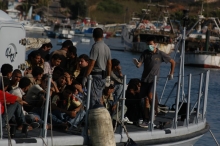Tragedy of Lampedusa underscores PSI migration demands

At least 114 men, women and children have died and at least 200 more are still unaccounted for following this accident. None were wearing lifejackets. Migrants who arrive on the Italian island of Lampedusa, which is just 11 kilometres from Tunisia, are processed in centres, screened for asylum and often sent back home.
PSI representatives are sending a strong message about how public services are a public good, designed to work in the interest of the people. Concern for the quality of public services is a mark of a society’s self-respect and commitment to caring for all, especially its most vulnerable members. When public services are cut, working families suffer, jobs are lost and poverty spreads, forcing people to migrate. When access to public services are denied, migrant workers and their families, women, children and young workers, are disproportionately affected.
Austerity measures have led to loss of jobs and reduction of essential public services, which are critical safety nets in times of crisis. Across Europe, we now have a new phenomenon of a “public sector working poor” marked with a wave of out-migration among public sector workers, among them doctors, nurses, and teachers, moving towards the northern countries in search of work. Some 120,000 professionals have left Greece since the start of the country's financial crisis in 2010.
PSI studies have documented how public services accessed by migrants, such as health, language support, social services (including emergency and medical services) and integration programmes have the first to be cut under austerity, creating a desperate situation for migrants and dire working conditions for public service workers who assist them.
Public service workers in the frontline communities, our first-responders, are there to provide support to migrants in distress. The tragic accident on the Mediterranean coast of Lampedusa, is just one of the many cases we face.

